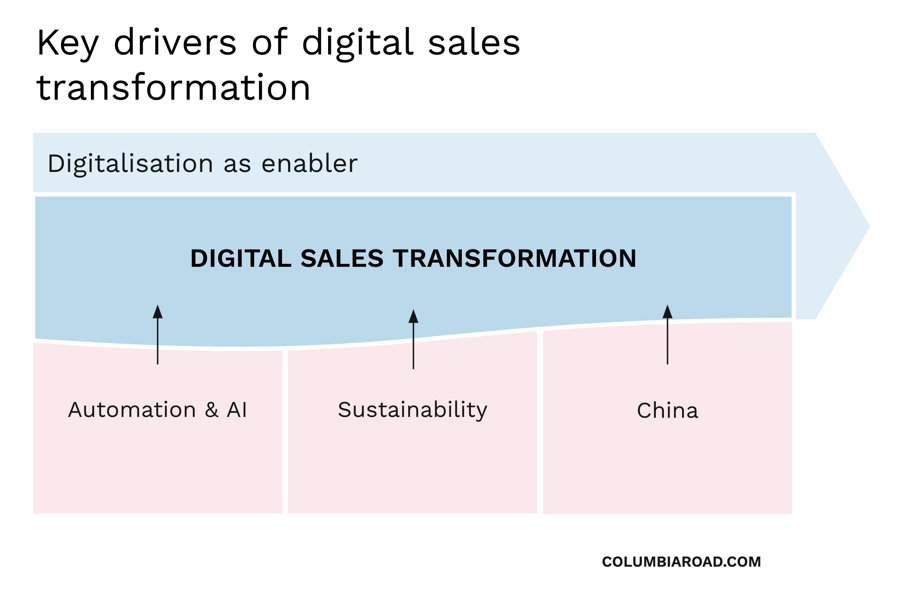The Data Handbook
How to use data to improve your customer journey and get better business outcomes in digital sales. Interviews, use cases, and deep-dives.
Get the bookSales and marketing are going through a massive transformation. Old ways of working and organising sales and marketing activities have been replaced by new digital tools, systems and processes during the past decades. At the same time consumers’ online shopping habits are changing and evolving. We have identified three ecommerce trends that are key drivers for digital sales transformation.
As digitalisation has been, and still is, the main enabler for this change, many organisations have been quick to adapt digital into their core business. The digitalisation agenda has, according to McKinsey, finally reached the corner office and is now on the top of the priority list for many CEOs — and the effects can be seen by everyone inside modern companies.
While CRMs, self-service portals and chatbots are becoming common practises for many organisations, the forerunner companies of today are already building more holistic sales and marketing architectures. All best-of-breed companies operate their sales capabilities with cross-functional ways of working and growth hacking methods where sales, marketing, IT and business all work together in the same team.
But this is not enough. In the ongoing sales transformation story this is just the beginning. Flexible sales architecture, digitally enhanced customer experience and ongoing revenue optimisation enabled by a growth hacking organisation is the winning formula of today — but in order to succeed in future every company needs to keep evolving.
In addition to the massive digital transformation forces ongoing today, there are three major trends every sales organisation needs to tackle to make themselves future-proof.

1. Automation & AI
In medium to long-term, the automation of digital sales, achieved with artificial intelligence, will be the biggest force transforming sales. Successful organisations of today are already looking for ways to scale their sales operations exponentially with new automation and AI powered technologies.
Companies automating their sales are aiming for two gains: 1) to achieve cost savings through highly effective and efficient use of sales, marketing and customer service resources and 2) to scale revenues with automated revenue optimisation throughout the customer journey.
"With automating sales companies aim for two gains -- saving costs and scaling revenues"
In practise, automation and the use of AI will be visible in extremely high level customer personalisation, fully automated advertising, fully automated optimisation and growth hacking processes, fully automated outbound and inbound sales and in fully automated customer service. Customer lifetime value will be optimised automatically in all customer channels and touchpoints — without any manual work.
Further in the future there will no longer be, for example, ecommerce managers, media buyers or tele-sales personnel as we know them today; everything and beyond in sales and marketing will be done by automation and artificial intelligence — leaving more time for people to focus on customer interactions and service. The roles and responsibilities in sales and marketing organisations will look totally different in the future.
But unlike in traditional self-service oriented automation, the new artificial intelligence powered automation will result in better customer experience. As everything from ads to content to pricing to customer communications can be optimised and automated for the segments of one customer, the customer will truly be treated like a king.

2. Sustainability
While automation & AI are the biggest trends driving the change inside the sales organisation, sustainability is the major force driving the transformation of sales in the outside world. Customer’s online shopping habits in both B2C and B2B are changing fast because of the rapidly rising awareness of sustainability and widespread worries about global warming. Already today customers require a new level of environmental responsibility from companies they are doing business with.
The requirement for companies to work towards a more sustainable world is a real challenge for many traditional businesses — at the same time many companies see it as a true business opportunity. Transforming sales towards a more sustainable business models will create new business areas and opportunities, but it can also increase revenues and improve company cost effectiveness in the medium term. Circular economy, for example, will be a game changer for a large number of digital sales organisations. A good example in this front is IKEA as they are rapidly changing from sales focus towards renting furniture (furniture as a service) instead of only selling them.
Also, for many companies we have been working with, the focus is no longer to sell more in quantity, but to sell more in higher price categories and, indirectly, less in quantity. In other words, customers will be consuming less but paying more for higher quality. This may also provide better overall margins already today, although it depends heavily on the context of the manufacturing process and the dynamics of the purchase. The best companies in the future will be known for highly efficient, cost effective and sustainable manufacturing processes that produce high quality products consumers are willing to pay the extra premium for.
But will the change in consumer mindset ever be big or fast enough to force this kind of change? It may well be that while we are waiting for the mainstream to change their customer behaviour, new kind of sustainability focused regulations and taxation models will in the short and medium term push companies towards these kinds of operational changes even faster than the forthcoming change in customer behaviour. An extra sales-tax for a non-sustainably produced products or services might be a reality in a not-so-distant-future.
Foreseeing how the change will exactly happen is hard — but it will eventually happen. Sustainability will bring major changes and create opportunities for sales transformation in, for example, the following three areas. Many of our customers are already, if not implementing, then at least considering how to approach these topics:
Sustainability affects sales focus
- Driving the customers’ focus from high volume & low price products towards low volume & high price. In other words: increasing revenues by selling less.
- More focus on selling (sustainable) services instead of products.
- Showcasing the sustainability aspect of all products & services sold throughout the customer journey.
- Pushing through digital sales and growth activities on business tracks that are based on sustainable business.
Sustainability affects back-office sales processes
- Transforming logistics and delivery processes to minimise carbon footprint from back-office logistics processes to order-to-delivery customer facing interfaces.
- Transforming sourcing and manufacturing processes to cater new sustainability requirements better.
- Transforming return processes to minimise cost related to returns but at the same time both minimise the carbon footprint of deliveries and maximise product lifetimes.
Sustainability brings new business opportunities
- Opening up to circular-economy and peer-to-peer related business opportunities in sales and after-sales.
- Building businesses around returns and secondary markets for products.
- Transforming business focus from product manufacturing to services around the products.
The list above is far from comprehensive, but it shows well the breath of opportunities in transforming sales towards more sustainable business. And as in automation and AI, also in this case the new ways to build sustainability in sales are made possible by digitalisation. It is the digital possibilities and digital sales transformation that are key enablers for a new kind of sustainability.
All companies will face these challenges in the near future. Sustainability will become a key competitive advantage in sales.
"It is the digital possibilities and digital sales transformation that are key enablers for a new kind of sustainability."
3. China
People tend to think that digital commerce innovation is coming from the United States, and in particular from the Silicon Valley — but this is no longer the case. For years China has been the key driver for retail, ecommerce and digital sales innovation.
Companies in the Chinese market are already today doing the things from the future. Chinese ecommerce is years ahead of what we westerners are used to: long time before people had even heard about first rumours of Amazon Go Cashier-less Store, there was already a chain of similar stores running in China, and hundreds of cashier-less stores are business as usual all around China.
China is also a massive market on its own, and even minor changes in its domestic economy may have drastic impact on businesses far away. Rapidly growing China is, among other things, a big importer of many raw materials as well as semi-finished-products and it has a major foot-print in the global B2B market. China’s middle-class is also exploding in size, and more and more of that middle-class is spending money on digital channels - creating a huge online market for companies inside and outside China.
Obviously China has some critical challenges, many related to human rights and human rights violations, labour rights, and loose manufacturing and exporting regulations that can be very different to regulations in the western countries and in the EU. China has had major problems with sustainability and environmental issues and many might see it even as a counter force to sustainability — although a potentially more sustainable China can also be seen as a huge opportunity. Because of these reasons it is far from unproblematic to do business in China or to compete with Chinese companies: and many companies need to be able to answer the inconvenient questions above.
China is a complex and vast “trend” to comprehend — but its impact will be big in many digital sales related areas. Therefore you need to keep an eye on the different effects it has on the online sales in the short and in the long term — even in cases where you are not doing business directly in or with China.
Learn how to thrive at the turning point of digital sales by reading The Digital Sales Transformation Handbook. Discover how digital sales transformation is changing companies, and how your business can leverage this change through organisational development, customer experience, ways-of-working and technology. Featuring interviews with industry experts, such as Marta Dalton (eCommerce Director for Unilever and Coca-Cola previously), Risto Siilasmaa (Founder of F-Secure) and Antti Kleemola (CDO of VR, Finnish Railways).
The Data Handbook
How to use data to improve your customer journey and get better business outcomes in digital sales. Interviews, use cases, and deep-dives.
Get the book




